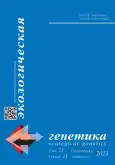SITE-directed mutagenesis for producing grain sorgum mutants with improved kafirine digestibility
- Authors: Elkonin L.A.1, Gerashchenkov G.A.2, Borisenko N.V.1, Kenzhegulov O.A.1, Sarsenova S.K.1, Panin V.M.1, Rozhnova N.A.2
-
Affiliations:
- Federal Centre of Agriculture Research of South-East Region
- Institute of Biochemistry and Genetics — Subdivision of the Ufa Federal Research Centre of the Russian Academy of Sciences
- Issue: Vol 21 (2023): Спецвыпуск
- Pages: 48-49
- Section: Genetically modified organism. The Нistory, Achivements, Social and Environmental Riscs
- Submitted: 31.07.2023
- Accepted: 26.08.2023
- Published: 04.12.2023
- URL: https://journals.eco-vector.com/ecolgenet/article/view/567897
- DOI: https://doi.org/10.17816/ecogen567897
- ID: 567897
Cite item
Full Text
Abstract
The use of genome editing technologies opens wide opportunities for the targeted mutagenesis in important agricultural crops. In the context of global warming, sorghum, an important drought- and heat-tolerant crop is of particular importance. However, compared to other cereals, sorghum grain has a lower nutritional value, due to the resistance of its storage proteins (kafirins) to proteolytic digestion. A decrease in the synthesis of kafirins as a result of mutations or the expression of the RNAi genetic constructs modifies the ultrastructure of protein bodies and improves their digestibility by proteases. To obtain mutants with improved protein digestibility, we created four binary vectors for site-directed mutagenesis of the k1C5 and gKAF1 genes encoding α- and γ-kafirin, respectively. Each of these vectors contained the cas9 endonuclease gene and a guide RNA targeted the nucleotide sequences encoding the kafirin signal polypeptides. By means of agrobacterial transformation, the created vectors were introduced into the genome of the grain sorghum cv. Avans. 14 transgenic plants were regenerated. Sequencing of 5 regenerants obtained using a vector for the k1C5 mutagenesis revealed 3 plants with mutations. The offspring of these mutants had a higher digestibility of grain proteins in vitro (86–92%) compared to the initial cv. Avans (63–67%). Notably, the T1 plants lacked the cas9 gene and the bar marker gene, which indicates the production of mutants with the edited k1C5 gene sequence, which lack the genetic construct that induced this mutation. Two mutants with mutations in the gKAF1 sequence were obtained. Thus, using the CRISPR/Cas technology, we have obtained mutants with improved digestibility of kafirins, which can be used in practical sorghum breeding.
Full Text
The use of genome editing technologies opens wide opportunities for the targeted mutagenesis in important agricultural crops. In the context of global warming, sorghum, an important drought- and heat-tolerant crop is of particular importance. However, compared to other cereals, sorghum grain has a lower nutritional value, due to the resistance of its storage proteins (kafirins) to proteolytic digestion. A decrease in the synthesis of kafirins as a result of mutations or the expression of the RNAi genetic constructs modifies the ultrastructure of protein bodies and improves their digestibility by proteases. To obtain mutants with improved protein digestibility, we created four binary vectors for site-directed mutagenesis of the k1C5 and gKAF1 genes encoding α- and γ-kafirin, respectively. Each of these vectors contained the cas9 endonuclease gene and a guide RNA targeted the nucleotide sequences encoding the kafirin signal polypeptides. By means of agrobacterial transformation, the created vectors were introduced into the genome of the grain sorghum cv. Avans. 14 transgenic plants were regenerated. Sequencing of 5 regenerants obtained using a vector for the k1C5 mutagenesis revealed 3 plants with mutations. The offspring of these mutants had a higher digestibility of grain proteins in vitro (86–92%) compared to the initial cv. Avans (63–67%). Notably, the T1 plants lacked the cas9 gene and the bar marker gene, which indicates the production of mutants with the edited k1C5 gene sequence, which lack the genetic construct that induced this mutation. Two mutants with mutations in the gKAF1 sequence were obtained. Thus, using the CRISPR/Cas technology, we have obtained mutants with improved digestibility of kafirins, which can be used in practical sorghum breeding.
About the authors
Lev A. Elkonin
Federal Centre of Agriculture Research of South-East Region
Email: lelkonin@gmail.com
ORCID iD: 0000-0003-3806-5697
Dr. Sci. (Biol.), Chief Researcher
Russian Federation, SaratovGrigoryi A. Gerashchenkov
Institute of Biochemistry and Genetics — Subdivision of the Ufa Federal Research Centre of the Russian Academy of Sciences
Email: apomixis@anrb.ru
ORCID iD: 0000-0003-1042-8273
SPIN-code: 3373-1045
Cand. Sci (Biol.), Senior Researcher
Russian Federation, UfaNatalie V. Borisenko
Federal Centre of Agriculture Research of South-East Region
Email: borisencko-n.v@yandex.ru
ORCID iD: 0000-0003-3543-9083
Junior Researcher
Russian Federation, SaratovOdissey A. Kenzhegulov
Federal Centre of Agriculture Research of South-East Region
Email: odissey94.sid@mail.ru
ORCID iD: 0000-0002-1272-3105
Junior Researcher
Russian Federation, SaratovSaule Kh. Sarsenova
Federal Centre of Agriculture Research of South-East Region
Email: saulesarsenowa@mail.ru
ORCID iD: 0009-0007-2471-1631
Russian Federation, Saratov
Valery M. Panin
Federal Centre of Agriculture Research of South-East Region
Email: panin-vm@yandex.ru
ORCID iD: 0009-0007-2851-415X
SPIN-code: 4049-8627
Cand. Sci (Biol.), Leading Researcher
Russian Federation, SaratovNatalia A. Rozhnova
Institute of Biochemistry and Genetics — Subdivision of the Ufa Federal Research Centre of the Russian Academy of Sciences
Author for correspondence.
Email: nata2013@gmail.com
ORCID iD: 0000-0001-5556-7993
SPIN-code: 5425-2635
Cand. Sci (Biol.), Senior Researcher
Russian Federation, UfaReferences
Supplementary files










